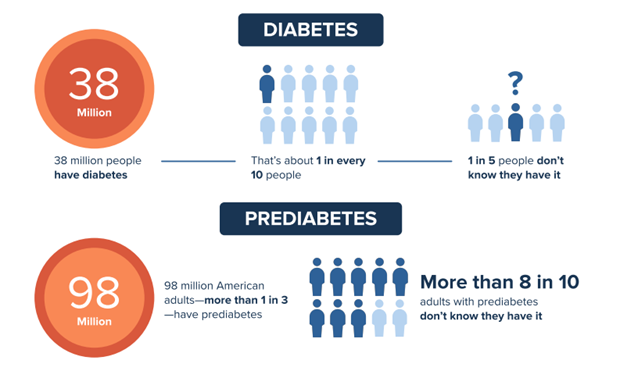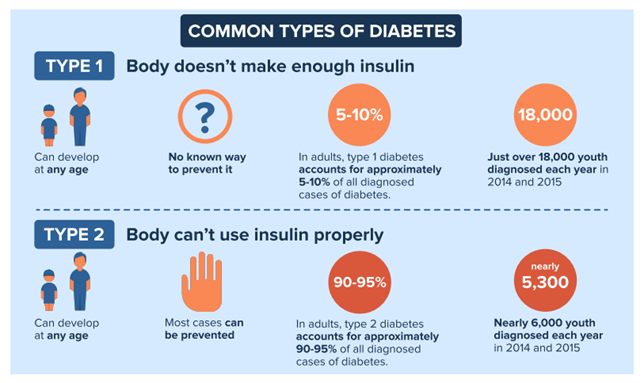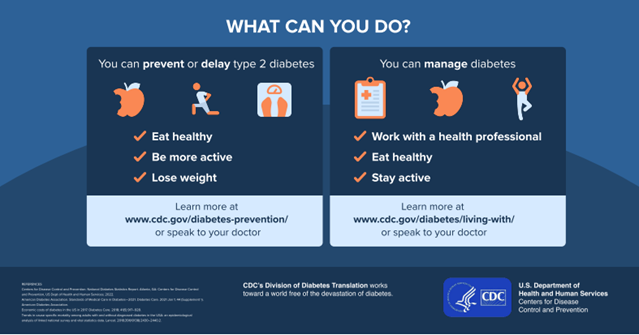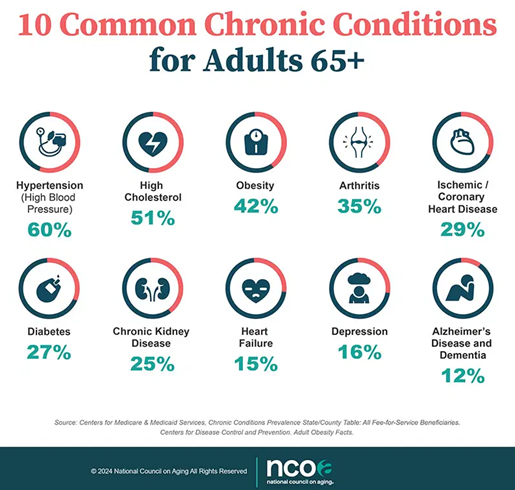Chronic conditions are those that are long lasting and can worsen over time. They require ongoing medical attention and lifestyle management and can limit activities of daily living. Common conditions such as heart disease, cancer, and diabetes are the leading cause of death and disability in the U.S. Six out of 10 American adults have at least one chronic condition and 4 in 10 have more than one chronic condition, according to the CDC.
Key risk factors for chronic conditions include smoking. Over 16 million Americans are living with diseases caused by smoking, such as cancer, heart disease stroke, and several lung diseases.
Poor nutrition and physical inactivity are key risk factors for chronic conditions including obesity, type 2 diabetes, stroke, certain cancers, and depression.
Another key risk factor is excessive alcohol use which can lead to serious problems, including alcohol use disorder and problems with learning, memory, and mental health. Chronic health conditions linked to excessive alcohol use include high blood pressure, heart disease, stroke, liver disease, and some kinds of cancer.
Other key factors are known as social determinants of health. These include nonmedical factors such as living in communities without safe spaces like parks to be physically active, or grocery stores that sell fresh fruits and vegetables. In some rural areas, it's hard to get medical care because of doctor shortages, hospital closures, or long distances to care. This makes it challenging to get preventive screenings or specialist follow-up care.
Source: https://www.cdc.gov/chronic-disease/index.html
Diabetes is a condition in which the body’s cells are unable to use insulin well. It is a key focus area due to the severity of its costs and heath consequences. In the USA over 38.4 million adults over the age of 18 have diabetes (14.7%). The percent of people who have diabetes in Nebraska and in the U.S. has been on the rise since 2000.

Diabetes can lead to some very serious health problems such as:
• Diabetes is the leading cause of blindness among adults 18-64.
• Diabetes is known to result in kidney disease or kidney failure, lower-limb amputations, and blindness.
• The average person with diabetes could spend between $3,300 and $4,600 a year on out-of-pocket costs.
• Diabetes is the 7th leading cause of death in Nebraska and the USA.
• 38 million Americans have prediabetes a many are unaware that they are at risk for developing type 2 diabetes.
Here is a snapshot of diabetes in the United States:

Though there are three main types of Diabetes, we primarily focus on preventing Type 2 because it is known to be preventable.
- Type 1 Diabetes: Cannot be prevented and makes up 5% of cases of diabetes in adults. Diagnosed more commonly among children.
- Type 2 Diabetes: Onset is more gradual and makes up 90-95% of cases of diabetes in adults. It can be prevented with lifestyle and environmental modifications.
- Gestational Diabetes (GDM): Develops during pregnancy and can lead to complications if not managed. Women who develop GDM during pregnancy have significant risk for developing type 2 diabetes later in life.
- Prediabetes is often a precursor to developing type 2 diabetes.
- Your doctor can diagnose diabetes or GDM using blood tests. The blood tests show if your blood glucose (sugar) level is higher than the range that is healthy for you.

Risk Factors for Developing Type 2 Diabetes:

What You Can Do:

PREVENTING CHRONIC CONDITIONS
Most people can prevent chronic conditions by avoiding the key risk factors such as tobacco use, poor nutrition, physical inactivity, and excessive alcohol use and getting good preventative care. Doing these things can improve your chance of staying well, feeling good, and living longer.
Prevention steps and strategies
Quit Smoking
Stopping smoking (or never starting) lowers the risk of serious health problems, such as heart disease, cancer, type 2 diabetes, and lung disease, as well as premature death—even for longtime smokers. Take the first step and call 1-800-QUIT-NOW for FREE support.
Quit Smoking
Tips From Former Smokers
Eat Healthy
Eating healthy helps prevent, delay, and manage heart disease, type 2 diabetes, and other chronic diseases. A balanced, healthy dietary pattern includes a variety of fruits, vegetables, whole grains, lean protein, and low-fat dairy products and limits added sugars, saturated fats, and sodium.
ChooseMyPlate.gov
How to Have Healthier Meals and Snacks
Get Regular Physical Activity
Regular physical activity can help you prevent, delay, or manage chronic diseases. Aim for moderate intensity physical activity (like brisk walking or gardening) for at least 150 minutes a week, with muscle-strengthening activities 2 days a week.
Physical Activity and Health
Adding Physical Activity to Your Life
Physical Activity for a Healthy Weight
Limit Alcohol
Over time, excessive drinking can lead to high blood pressure, various cancers, heart disease, stroke, and liver disease. By not drinking too much, you can reduce these health risks.
Alcohol Use and Your Health
Check your alcohol use and make a customized plan for drinking less.
Get Screened
To prevent chronic diseases or catch them early, visit your doctor and dentist regularly for preventive services.
Cancer Screening Tests
Prediabetes and Diabetes Testing
Take Care of Your Teeth
Oral diseases—which range from cavities and gum disease to oral cancer—cause pain and disability for millions of Americans. To help prevent these problems, drink fluoridated water, brush with fluoride toothpaste twice a day, and floss daily. Visit your dentist at least once a year, even if you have no natural teeth or have dentures.
More Oral Health Tips
Get Enough Sleep
Insufficient sleep has been linked to the development and poor management of diabetes, heart disease, obesity, and depression. Adults should get at least 7 hours of sleep daily.
Basics About Sleep
Know Your Family History
If you have a family history of a chronic disease, like cancer, heart disease, diabetes, or osteoporosis, you may be more likely to develop that disease yourself. Share your family health history with your doctor, who can help you take steps to prevent these conditions or catch them early.
Know and Act on Your Family Health History
Be Proactive with Your Health
Join a proven community workshop to learn strategies to help you prevent developing or worsening chronic conditions. PPHD offers the National Diabetes Prevention Program which has been proven to prevent type 2 diabetes. Keep scrolling to learn more.
National Diabetes Prevention Program (DPP) in the Panhandle







